
INSTITUTE FOR ENERGY
Sustainability
SUSTAINABILITY
Reverence for All Life and for the Goodness of All Humanity
As children of God, we are brothers and sisters to each other, to all humanity, and to all God's creatures. Thus, we strive to show reverence for all human life and for life in all its forms, to treat all people with dignity and respect, and to work together for the common good. In a spirit of charity, we care for and support each other, helping to bind the wounds of those who suffer and bearing one another's burdens. We also care for the earth which is our home and work to protect and preserve it for future generations.
Sustainable Resources & Green Initiatives on Campus
SUSTAINABILITY UNIVERSITY EFFORTS
What is Saint Francis Doing?
Saint Francis University engages in several university-wide efforts to promote sustainability. Below you will discover examples of our efforts.
-
Saint Francis University implemented a recycling program in 1991 to reduce landfill waste and demonstrate Franciscan stewardship of our environment. Most classrooms and offices have paper collection and in many hallways one will find collection bins. A number of items are also accepted at the large community recycling bins located at 350 Saint Joseph Street, Loretto, PA.

-
The DiSepio Institute for Rural Health and Wellness features a geothermal heating and cooling system that reduces the amount of pollution emissions that would be generated from traditional heating sources. In addition, the albedo (white) roof reflects solar light to reduce the amount of heat that the DiSepio Institute receives.
.jpg)
-
Dining services uses a term called “EcoSteps" to communicate the steps we are taking to reduce our environmental footprint. These EcoSteps are “our steps to sustainability” to continually expand our role as a socially responsible university while providing exceptional hospitality to all of our guests. The EcoStep’s logo highlights items that are part of our sustainability program. Below are the EcoSteps that St. Francis Dining currently has accomplished:
- Commitment to local foods through our FarmSource program
- rBGH-free milk products from Vale Wood Dairy
- Eliminated trays to reduce food waste and water consumption
- Introduced reusable “Eco-clam Shells” to eliminate Styrofoam containers.
- Hoop House supplies year round herbs and seasonal vegetables grown by students.
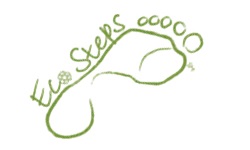
-
Located on campus, this 1.5 mile path winds though a variety of different nature habitats on campus. The trail was designed to provide access to the University's quieter, more natural areas and to increase knowledge of our local ecology. In addition to its recreational use, the trail and surrounding ecosystem are used by the Dr. Wayne and Elizabeth Takacs Biology Department and other members of the campus and local community as a site to conduct scientific research and to promote environmental education. The trail is open to use by all members of the community.
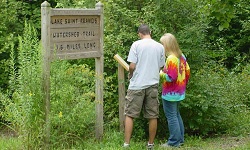
-
Refilling a water bottle is made easy with hydration stations located in buildings around campus. Station locations include:
- DiSepio Institute
- JFK Student Center (lower level)
- Science Center
- Schwab Hall
- Stokes Athletic Center
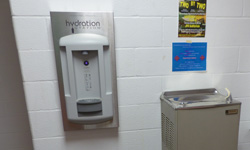
-
The park, located on the southern edge of campus, has been designed to provide residents, students, and visitors a multi-purpose area to enjoy recreational and learning opportunities. Features such as a walking path, fitness stations, outdoor classroom, playground equipment, picnic tables, grills, benches, and bike racks provide users with a wide variety of options for recreational and health and wellness activities.
Utilizing sustainable and green building practices were integral to the park’s construction. The project site is adjacent to a portion of natural woodland and wetland complex that runs along the floodplain of an unnamed tributary to Clearfield Creek. Over the years, the land had been used to hold rock and soil construction wastes. During construction, these previously disturbed wetland areas were restored by removing the earth and rock fill and great care was taken to avoid additional impacts.
The vision for the park was to present a natural, sustainable, and inviting outdoor space as opposed to a well-manicured, programmed area with a sterile feel. Bioretention/rain garden areas have been constructed along the sides of the park to absorb drainage and runoff. Plantings include PA native species (including Red Maples, Tulip Trees, and Eastern Hemlocks) as well as vegetated swales and “no mow” meadow grasses around the park’s boundaries. The outdoor classroom, fitness stations, benches, picnic tables, and trash/recycling receptacles are mounted on permeable bases to assist with runoff. The playground equipment, picnic tables, and benches are made from recycled plastic materials and the restrooms are an environmentally-friendly waterless system.
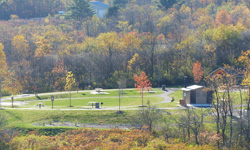
Saint Francis University implemented a recycling program in 1991 to reduce landfill waste and demonstrate Franciscan stewardship of our environment. Most classrooms and offices have paper collection and in many hallways one will find collection bins. A number of items are also accepted at the large community recycling bins located at 350 Saint Joseph Street, Loretto, PA.

The DiSepio Institute for Rural Health and Wellness features a geothermal heating and cooling system that reduces the amount of pollution emissions that would be generated from traditional heating sources. In addition, the albedo (white) roof reflects solar light to reduce the amount of heat that the DiSepio Institute receives.
.jpg)
Dining services uses a term called “EcoSteps" to communicate the steps we are taking to reduce our environmental footprint. These EcoSteps are “our steps to sustainability” to continually expand our role as a socially responsible university while providing exceptional hospitality to all of our guests. The EcoStep’s logo highlights items that are part of our sustainability program. Below are the EcoSteps that St. Francis Dining currently has accomplished:
- Commitment to local foods through our FarmSource program
- rBGH-free milk products from Vale Wood Dairy
- Eliminated trays to reduce food waste and water consumption
- Introduced reusable “Eco-clam Shells” to eliminate Styrofoam containers.
- Hoop House supplies year round herbs and seasonal vegetables grown by students.

Located on campus, this 1.5 mile path winds though a variety of different nature habitats on campus. The trail was designed to provide access to the University's quieter, more natural areas and to increase knowledge of our local ecology. In addition to its recreational use, the trail and surrounding ecosystem are used by the Dr. Wayne and Elizabeth Takacs Biology Department and other members of the campus and local community as a site to conduct scientific research and to promote environmental education. The trail is open to use by all members of the community.

Refilling a water bottle is made easy with hydration stations located in buildings around campus. Station locations include:
- DiSepio Institute
- JFK Student Center (lower level)
- Science Center
- Schwab Hall
- Stokes Athletic Center

The park, located on the southern edge of campus, has been designed to provide residents, students, and visitors a multi-purpose area to enjoy recreational and learning opportunities. Features such as a walking path, fitness stations, outdoor classroom, playground equipment, picnic tables, grills, benches, and bike racks provide users with a wide variety of options for recreational and health and wellness activities.
Utilizing sustainable and green building practices were integral to the park’s construction. The project site is adjacent to a portion of natural woodland and wetland complex that runs along the floodplain of an unnamed tributary to Clearfield Creek. Over the years, the land had been used to hold rock and soil construction wastes. During construction, these previously disturbed wetland areas were restored by removing the earth and rock fill and great care was taken to avoid additional impacts.
The vision for the park was to present a natural, sustainable, and inviting outdoor space as opposed to a well-manicured, programmed area with a sterile feel. Bioretention/rain garden areas have been constructed along the sides of the park to absorb drainage and runoff. Plantings include PA native species (including Red Maples, Tulip Trees, and Eastern Hemlocks) as well as vegetated swales and “no mow” meadow grasses around the park’s boundaries. The outdoor classroom, fitness stations, benches, picnic tables, and trash/recycling receptacles are mounted on permeable bases to assist with runoff. The playground equipment, picnic tables, and benches are made from recycled plastic materials and the restrooms are an environmentally-friendly waterless system.


Recycling at SFU
Saint Francis University implemented a recycling program in 1991 to reduce landfill waste and demonstrate Franciscan stewardship of our environment. Bins can be found in buildings throughout campus. In addition, a community recycling center is located at 350 Saint Joseph Street, Loretto, PA.
The following items can be recyled on campus:
- Platic #1 and #2-narrow*
- Office Paper
- Newspaper, Carboard, and Glossy Papper (Magazines)
- Aluminum & Other Cans
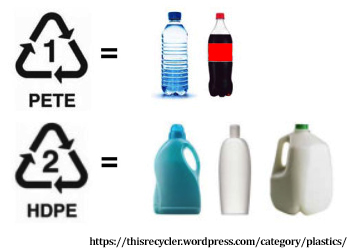
Look on the bottom for the number.
Lids can go in; leave off of the container.
*#2 plastics with a narrow opening only. (Why not other #2 plastics? Because of a difference in production, the recycling processes are not the same.)
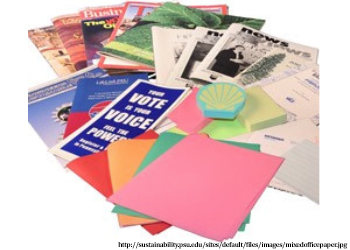
- White paper
- Colored paper
- Envelopes (windows are OK)
These items may be placed NEXT TO the bins.
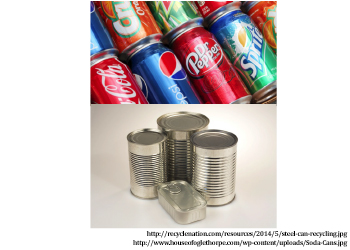
- Aluminum cans
- Soup & similar cans
Another way to recycle is by donating unneeded clothing and supplies.
- Clothing, Kitchenware, Home Decor, and Toys can be donated to the Dorothy Day Outreach Center
- Office Supplies no longer used in your department at SFU can be recirculated across the campus community
We cannot recycle glass, other plastics, aerosol cans, anything hazardous, or compostable items… but we are working on it! Learn about other opportunities through the Cambria County Solid Waste Authority.

ACADEMIC CENTERS & CLUBS
Renew Your Future
As a student at Saint Francis University, you will have the opportunity to not only learn ways to care for the environment, but to be proactive about it as well!
Below are some of our education, research, and academic activities for a brighter tomorrow
Academic Programs & Courses
Explore our Academic Offerings
Centers & Academic Activities
Renewable Energy Center at the Insitute for Energy
Center for Watershed Research and Service
Clubs
- Beekeeping Club
- Environmental Action Society
- Environmental Engineering Society
View All of Our Club Offerings

INDIVIDUAL EFFORTS
What Can You Do?
Turn It Off
Turn off the lights when you leave the room or when natural lighting is sufficient. Plug office equipment into power strips so you can hit one button, shut everything off, and save energy and money.
Climate Control
Set the temperature in your room or office on a moderate setting. When possible, turn it down when you leave for an extended period of time (e.g. - overnight or weekends).
Shorten Your Shower
Try to take shorter showers. The less hot water you use, the less energy is needed to heat the water.
Lighten Up
Replace your light bulbs with energy efficient, compact fluorescent or LED lights. The life span of these light bulbs is 8 times as long or more as regular light bulbs. Save on electricity and on having to always buy new light bulbs.
Wasteful Windows
Use windows wisely! If your room or office is too hot, adjust the thermostat rather than opening the window. If you need some fresh air, turn off the heat or AC.
Let the Sunshine In!
Arrange your office or dorm room so that nothing is obstructing the window. Use natural lighting during the day and make sure to turn off all lights when leaving a room. Not just in your office but in the restrooms, classrooms, and lounges as well.
Give It a Rest
Set your computer to sleep after ten minutes of activity. Screensavers DO NOT conserve energy - but stand-by and hibernate do! Go to the control panel on your computer, select Power Options, then select "Maximum Battery Life" or whatever the highest efficiency setting is.
Shop 'Til You Drop
Vote with your dollars for a cleaner, healthier world. Shop until you drop.... your impact on the environment. Always buy Energy Star appliances and electronics, organic foods, organic cotton, Fair Trade items, and other products that limit packaging, are "natural" and free from unnecessary chemicals - and always bring your own bag.
Watch Your Backside
Reuse the backside of paper when printing and making copies - or taking notes, writing letters, etc.
Create an Antique Envelope
Use/reuse interoffice envelopes. Use them for so long they become antiques!
Just Say No
Say no to junk mail and consumer catalogs by removing your name from mailing lists. You can remove your name by going to catalogchoice.org or dmachoice.org.
Share a Ride
Carpool when possible. Meet new people, enjoy great conversation and music... and split the gas bill.


